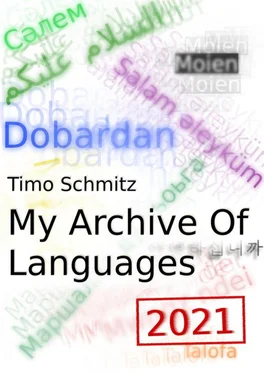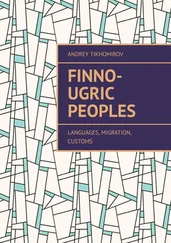1 ...6 7 8 10 11 12 ...19 yok – no
Sizde näme täzelik? – Do you have news? (frm.)
Mendede yok – I don’t have either, lit.: Me too no
Men muňa örän şat – I’m very happy
şat – happy
Bagyşlarsyňyz – Sorry! (formal)
Bagyşlarsyň – Soory! (informal)
Sen maňa bagyşla diy – You have to say sorry!
diy, ayt – to say
men diydim – I said
sen diydiň – you said
ol diydi – he/she/ it said
olar diydiler – they said
Turkmens sometimes write ñ instead of ň and ÿ instead of ý
/gɔʊmzɛŋɛz/ - How are you? (Daşoguz speech)
/gɔʊəmɨθɪŋɨz/ - How are you? (Aşgabat speech)
Türkmen dilini söýýärin – I love Turkmen language
Täzelik yok okuw diñe – No news, just studying
okuw diñe /oku: dɪŋɛ/ - just studying
şuwagt öye gaydyp baryan. /ʃwa: øjɛ gɒɪdɨp barjan/- I’m going back home now
şuwagt – now
öy(e) – (to) home
gaydyp – go back
baryan - grammar that mean continuousness
Men uniwersiteta gidip baryaryn – I’m going to university
Hökman däl – You’re welcome
Işdäñiz açyk bolsun /ɪʃdaŋɪz atʃɨk bɔlsun/– Bon appétit!
Menem - Me too
Menem şat – I’ happy too
şuwagt täzelik yok / ʃwat-ta:zɛlɪk jɔk/ – I have no news now
1- bir /bɛɒ/
2- iki /ɛkɛ/
3- üç
4-dört
5-bäş
6-alty
7-ýedi
8-sekiz /θekɪf/
9-dokuz /dɔ:kuf/
10-on
11-on bir
12-on iki
13-on üç
14-on dört
15-on bäş
20-ýigrimi /jiʀʀɨmi/
21- ýigrimi bir
30-otuz
40-kyrk
50-elli
60-altmyş
70-ýetmiš
80-segsen
90-togsan
In ancient times, when a child was named after their grandfather or grandmother, and the grandfather/ grandmother passed away, one’s own child bearing the same name was not called with their name anymore, but the title of the person was said, adding ‘jan’ to it, in this way the modern girls’ name Ejeş came into being. Ejeşjan – dear mother
eje – mom
kaka – dad
baba /bava/ – granddad (mother’s side)
mama – grandma (mother’s side)
ata – granddad (father’s side)
ene – grandma (father’s side)
ene-ata – parents
jigi /tʒiji/ – little sister or little brother
aga /aʀa/ – elder brother
ini – younger brother
uya – sister
3 – Men sen bilen türkmençe yazyşan wagtym hemişe şat
Men sen bilen türkmençe yazyşan wagtym hemişe şat – When I write with you in Turkmen, I'm always happy
men – I
sen – you
bilen – with
Türkmence – Turkmen language
yazyşmak - to text
wagt – time
wagtym – my time
hemişe – always
şat – happy
Adyn näme? /adɨn næ:mɛ/ – What’s your name?
Sagat näçe /sa:at nætʃɛ/ – What’s the time?
Sen näçe ýaşynda? /sən nætʃɛ jaʃɨn’da/ – How old are you?
Sen nireden? – Where are you from?
Sen näçe dogan? /sən nætʃɛ dɔgun/ - Do you have siblings?
Doglan gunun gutly bolsun /dɔ:lun gunun gut’lɨ bolsən/ - Happy birthday!
Bayramyn bilen /bajraman b(i)lən/ - Congratulations
Hoş geldiňiz – Welcome!
Bu menin ejem – This is my mother!
Bu menin kakam – This is my father!
Bu menin gyz doganym /bu: menɪn gɪz dɔʊanəm/ - This is my older sister
Bu menin gyz jigim – This is my younger sister
Bu menin oglan doganym / bu: menɪn ɔ:lɒn dɔʊanəm/ - This is my older brother
Bu menin oglan jigim – This is my younger brother
Bu menin mamam – This is my grandmom!
Bu menin babam – This is my grandfather
Dayza /dajza/ - aunt
dayy /da:i/ - uncle
Näme edýarsiň? – What are you doing?
Sen nirde ýashaýan? – Where do you live?
gitmek – to go (infinite form)
men gidyärin – I go
sen gidyärsiñ - you go
ol gidyär – he/she/it goes
biz gidyäris – we go
Siz gidyärsiñiz – you go (formal and used for elders)
Olar gidyäler – they go
almak – to take
men alyaryn – I take
sen alyarsyñ – you take
ol alyar – he/ she/ it takes
biz alyarys – we take
siz alyarsyñyz – you take(formal)
olar alyarlar – they take
gelmek – to come
men gelyärin – I come
sen gelyärsiñ – you come
ol gelyär – he/she/it comes
biz gelyäris – we come
siz gelyärsiñiz – you come (formal)
olar gelyärler – they come
to be, to become – bolmak
In Türkmen ‘coming online’ can’t be continuous, so it is: men online boldum
Sen Lüksemburga gelyärsinmi? – Are you coming to Luxembourg?
a and e suffix shows direction, for example: Öy means home
Men öye gelyärin – I come home
Men Türkmenistana gelyärin – I come to Turkmenistan
Men Özbekistana gelyarin – I come to Uzbekistan
a,o,u,y - thick vowels
ä,e,i,ö,ü - thin vowels
So when you add any conjugations or suffix prefix: You can only add thick vowel to the ones that end with thick vowels, and thin vowels to the ones that end with thin vowels
Türkmenche öwrenyanmi? – Do you learn Türkmen language?
Berekella – Good job!
Nireli sen? – Where are you from?
Sen nemetsmi? – Are you German?
mesele dal – You’re welcome!
Golestan Turkmen (Iran) – تورکمنچه
Najere? – How are you?
Nadyan? – How are you?
bagheshla – Excuse me, I’m sorry, Pardon me
ghawi – good
sagh ol – thanks
ghnimat – thanks
Men.... yashimda – I’m... years old
Men adim.... – My name is...
Gorishers – Goodbye!
Assalomu Alaykum! (Ассалому алайкум!) – Hello
Vaalajkum assalom! (Валайкум ассалом!) – Hello (reply)
Ishlaringiz yaxshimi? (Ишларингиз яхшими?) – How are you?
Yaxshimisiz? (Яхшимисиз?) – How are you? (Is everything alright?)
Ishlaringiz qanday? (Ишларингиз қандай?) – How are you?
Yaxshi, rahmat (Яхши, рахмат) – I’m fine, thanks.
Men juda yahshiman (Мен жуда яхшиман)– I’m fine, too.
juda (жуда) – too, also
Sizning ismingiz nima? (Сизнинг исмингиз нима?) – What’s your name? (formal)
Sening isming nima? (Сенинг исминг нима?) – What’s your name? (informal)
Mening ismim ... – My name is ...
Siz qay yerdansiz? – Where are you from?
Men ... – I’m from ...
Tanishganimdan hursandman – Pleased to meet you
Seni qurishga hursandman – Glad to see you
Sen hozir qaysi shaharda yashaysan? – In which city do you live now?, Where do you live now?
bu men (бу мен) – It’s me
Kuning qalay ketyapti? – How is your day going?
ajoyib (ажойиб) – perfect
bilaman – I know
albatta (албатта) – sure
Qiziq ekan (қизиқ екан) – That’s surprising
O'zingni saqla (ўзингни сақла) – Take care!
Qo'rishkuncha (қўришкунча) – See you!
bilmoq – to know
-man – I (suffix)
bilaman – I know
bilasan – you know
biladi – he/she/it knows
bilamiz – we know
bilasiz – you know (pl)
biladilar – they know
Barakalla – Good job!
Yangilik nima? – What’s new/ What’s the news?
yangi – news
marhamat, dostim – welcome, my friend
marhamat (марҳамат) – welcome (just like encouragement)
Читать дальше












